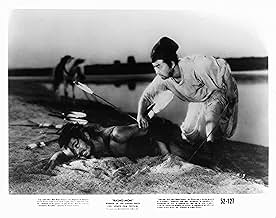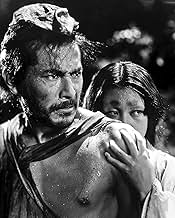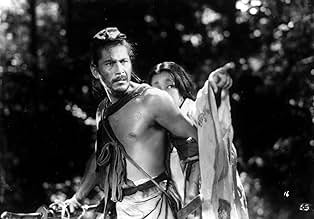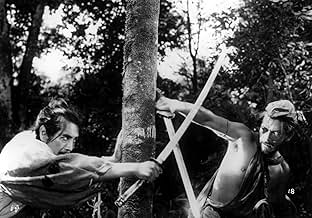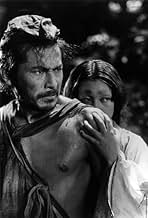A violação de uma noiva e o assassinato de seu marido samurai são lembrados desde a perspectiva de um bandido, da noiva, do fantasma do samurai e de um lenhador.A violação de uma noiva e o assassinato de seu marido samurai são lembrados desde a perspectiva de um bandido, da noiva, do fantasma do samurai e de um lenhador.A violação de uma noiva e o assassinato de seu marido samurai são lembrados desde a perspectiva de um bandido, da noiva, do fantasma do samurai e de um lenhador.
- Direção
- Roteiristas
- Artistas
- Indicado a 1 Oscar
- 9 vitórias e 5 indicações no total
- Direção
- Roteiristas
- Elenco e equipe completos
- Produção, bilheteria e muito mais no IMDbPro
Resumo
Reviewers say 'Rashomon' delves into the nature of truth and reality through multiple conflicting perspectives of a crime. Characters like the bandit, wife, samurai, and woodcutter offer varied accounts, showcasing subjective truth and human perception's unreliability. The film challenges viewers to question truth and personal biases' impact on storytelling. Its innovative narrative and cinematography highlight human nature's complexity and the struggle to find objective truth, receiving both acclaim and critique for its profound themes and structure.
Avaliações em destaque
"Rashomon" was Akira Kurosawa's first national hit (becoming, at the time, the highest-grossing foreign film in America) and even gained an Oscar for Best Foreign Film, but almost sixty years later it still hasn't lost any of its impact. It is widely revered as one of the most influential films of all-time, but unlike some other movies, it is not a film that feels dated. The revolutionary methods of Kurosawa are still effective and on-par with the cinema of today -- this isn't a movie where you say, "Yeah, fifty years ago it might have been different, but now it's done in all the movies." Kurosawa's techniques are still superior to most of his imitators. Look at the 2003 John McTiernan film, "Basic," which copies a good portion of "Rashomon's" concept. Which is the better film? It's not a hard choice.
The film begins under a structure which reads "Rashomon" on its exterior, in a small Japanese village. It's raining outside and a woodcutter (Takashi Shumura) and a priest (Minoru Chiaki) inadvertently find themselves in the company of a wandering commoner (Kichijiro Ueda), and as he asks them what is the matter they both begin to relay the most horrific story they claim to know -- of a brutal murder a few days prior.
Kurosawa then switches to flashback and we see three different versions of the exact same event -- the slaying of an innocent man (the murderer played by Kurosawa film regular Toshirô Mifune) in the woods outside the village. Was it because of lust? Betrayal? Envy? Or insanity? We hear from the murderer, the wife of the victim, and a woman channeling the spirit of the dead man.
"Rashomon" is brilliant. Some people have complained that the ending is a cop-out and sentimental hogwash, but I think Kurosawa was fond of sentimentality to a point (he uses a good deal of it in "Ikiru") but the difference between what he does with sentimentality as opposed to many filmmakers of today is that he uses to to ENRICH the story, not provide an easy solution to all the problems.
Is there resolution in the finale of "Rashomon"? To a degree. But, like "Ikiru," it also leaves an open answer to its audience -- this film questions us, and our humanity, and it says something about the human condition and our weaknesses as a species. Yet it also proposes that along with the evil is an inherent good, and in my opinion the message of "Rashomon" is just as important and effective as its film-making techniques and acting.
The film begins under a structure which reads "Rashomon" on its exterior, in a small Japanese village. It's raining outside and a woodcutter (Takashi Shumura) and a priest (Minoru Chiaki) inadvertently find themselves in the company of a wandering commoner (Kichijiro Ueda), and as he asks them what is the matter they both begin to relay the most horrific story they claim to know -- of a brutal murder a few days prior.
Kurosawa then switches to flashback and we see three different versions of the exact same event -- the slaying of an innocent man (the murderer played by Kurosawa film regular Toshirô Mifune) in the woods outside the village. Was it because of lust? Betrayal? Envy? Or insanity? We hear from the murderer, the wife of the victim, and a woman channeling the spirit of the dead man.
"Rashomon" is brilliant. Some people have complained that the ending is a cop-out and sentimental hogwash, but I think Kurosawa was fond of sentimentality to a point (he uses a good deal of it in "Ikiru") but the difference between what he does with sentimentality as opposed to many filmmakers of today is that he uses to to ENRICH the story, not provide an easy solution to all the problems.
Is there resolution in the finale of "Rashomon"? To a degree. But, like "Ikiru," it also leaves an open answer to its audience -- this film questions us, and our humanity, and it says something about the human condition and our weaknesses as a species. Yet it also proposes that along with the evil is an inherent good, and in my opinion the message of "Rashomon" is just as important and effective as its film-making techniques and acting.
It's hard to tell just how striking "Rashômon" might have seemed to those who watched it in 1950, rather than seeing it after so many subsequent movies and other works have made use of its techniques and ideas. But it's clear that it is a technical and creative success. The story itself is not particularly satisfying, which was most likely by design, and the movie is carried by its structure and by the concept of the markedly different perspectives on the same series of events. The cast also deserve their share of credit for how well it works, and the photography is excellent, as it is in almost all of Kurosawa's films.
Kurosawa's expertise makes the interwoven sequences of past and present - essentially telling two different stories - not only work flawlessly, but fit together thematically. It's even more commendable when compared to some of the subsequent films that have tried to use similar ideas, only to come off as pretentious rather than creative or innovative. Kurosawa was also working with much less in terms of possible precedents.
In one sense, the choice of specific story material could seem a little odd.
The downbeat, rather sordid scenario makes the movie somewhat less enjoyable than several of Kurosawa's other pictures (which is, admittedly, a pretty high standard), and as a result "Rashômon" is more a film to respect and admire than one to enjoy and take pleasure from. Still, it does have significantly more substance to it than do most of the more recent pictures that have been deliberately downbeat or negative in their portrayals of humanity. Such stories are more trendy at present, and they often receive undue praise simply for so being.
At the same time, the lack of sympathetic characters and the paucity of hopeful developments bring out all the more its success in developing its ideas about narrative and about reality, ideas that are more fundamental and, in their way, perhaps at least as important as any specific story or events.
Kurosawa's expertise makes the interwoven sequences of past and present - essentially telling two different stories - not only work flawlessly, but fit together thematically. It's even more commendable when compared to some of the subsequent films that have tried to use similar ideas, only to come off as pretentious rather than creative or innovative. Kurosawa was also working with much less in terms of possible precedents.
In one sense, the choice of specific story material could seem a little odd.
The downbeat, rather sordid scenario makes the movie somewhat less enjoyable than several of Kurosawa's other pictures (which is, admittedly, a pretty high standard), and as a result "Rashômon" is more a film to respect and admire than one to enjoy and take pleasure from. Still, it does have significantly more substance to it than do most of the more recent pictures that have been deliberately downbeat or negative in their portrayals of humanity. Such stories are more trendy at present, and they often receive undue praise simply for so being.
At the same time, the lack of sympathetic characters and the paucity of hopeful developments bring out all the more its success in developing its ideas about narrative and about reality, ideas that are more fundamental and, in their way, perhaps at least as important as any specific story or events.
Kurosawa's magic film is a composite of 2 Japanese short stories by Ryunosuke Akutagawa: One, "Rashomon," the title tells of a confrontation of a young man at Rashomon, the large, fortified gate at one entrance to Kyoto where people would abandon children and corpses; the other, yabu no naka ni, "In a Grove," tells of the confrontation between the bandit, the samurai and his wife, told from the point of view of the woodcutter. In 1950, Kurosawa weaves this tale of human vanity and duplicity with the young Toshiro Mifune, as the bandit, Machiko Kyo as the lady and Masayuki Mori as the samurai. The tale unfolds through the flashbacks in the narration of the great Takashi Shimura as the woodcutter, supported by character actors Minoru Chiaki as the monk and Kichijiro Ueda as the bum. Basically, with a cast of six and the stark settings of a woods and a dilapidated castle gate in pouring rain, Kurosawa the magician gives us four views of human vanity, excessive pride and cultural conflict. The foibles of human needs are exposed but redeemed in the final scene where the basic act of kindness brings closure to the bizarre display of greed, lust and mendacity that has gone before. For a Kurosawa film, this one is short, to the point with an economy of emoting-- for which Mifune was never accused of under doing and the viewer is left somewhat exhausted by all the twists and turns, confused by the mix of contradictions and seeming paradox, but satisfied with a feeling of hope.
'People forget the unpleasant things. They only remember what they want to remember.'
In Rashomon the editing tells ½ of the story. It may feel experimental or unconventional, but Kurosawa perfects the concept second by second, directing and editing. This film didn't need a big budget to come perfectly to the point. It's a simple tale, but not a superficial tale. Different points of view and selective memories ('It's true! I saw it!') don't only make the woods unsafe, but are one of the most universal topics of humanity. 'We humans are weak creatures. That's why we lie, even to ourselves' says it all actually: it's about what people want to hear and when they start being interested at all, apart from wishful thinking. Selfish excuses vs trust in other people.
Rashomon gets masterful when in one instant there is literally a different point of view: the camera takes another position to shoot the same sequence, thereby forcing the audience to reconsider what they just saw. That is the sort of storytelling that the supposed masters of cinema in our time yet have to equal, or try to copy when they fail. Admitted 'Memento' (2000, Nolan) is a truly great one. Still not THAT universal. 'Pulp Fiction' (1994) didn't come close, 'La Commare Secca' (1962) also didn't. 'Ghost dog: the way of the samurai' (1999) touched another border of the concept, or does it?
The use of (non-original) music in my opinion reveals a certain interest for western influence, not only in Rashomon, but also in Kurosawa's forthcoming films, and is probably why his films were so influential on western filmmakers too.
The cinematography is dynamic and changes scene by scene to emphasize exactly what is going on. The shadows of leaves and branches, captured by cinematographer Kazuo Miyagawa, make you really feel 'in the woods', while the actors (Toshirô Mifune, Takashi Shimura) convince the remaining part of the audience (which adds up to 100% breathless viewers). It may be after days that you first realize you saw an important film. After weeks you realize that you must see it again to comprehend (despite it's only 85 min), and ironically that is just one of the crucial points that Kurosawa made. 10/10
In Rashomon the editing tells ½ of the story. It may feel experimental or unconventional, but Kurosawa perfects the concept second by second, directing and editing. This film didn't need a big budget to come perfectly to the point. It's a simple tale, but not a superficial tale. Different points of view and selective memories ('It's true! I saw it!') don't only make the woods unsafe, but are one of the most universal topics of humanity. 'We humans are weak creatures. That's why we lie, even to ourselves' says it all actually: it's about what people want to hear and when they start being interested at all, apart from wishful thinking. Selfish excuses vs trust in other people.
Rashomon gets masterful when in one instant there is literally a different point of view: the camera takes another position to shoot the same sequence, thereby forcing the audience to reconsider what they just saw. That is the sort of storytelling that the supposed masters of cinema in our time yet have to equal, or try to copy when they fail. Admitted 'Memento' (2000, Nolan) is a truly great one. Still not THAT universal. 'Pulp Fiction' (1994) didn't come close, 'La Commare Secca' (1962) also didn't. 'Ghost dog: the way of the samurai' (1999) touched another border of the concept, or does it?
The use of (non-original) music in my opinion reveals a certain interest for western influence, not only in Rashomon, but also in Kurosawa's forthcoming films, and is probably why his films were so influential on western filmmakers too.
The cinematography is dynamic and changes scene by scene to emphasize exactly what is going on. The shadows of leaves and branches, captured by cinematographer Kazuo Miyagawa, make you really feel 'in the woods', while the actors (Toshirô Mifune, Takashi Shimura) convince the remaining part of the audience (which adds up to 100% breathless viewers). It may be after days that you first realize you saw an important film. After weeks you realize that you must see it again to comprehend (despite it's only 85 min), and ironically that is just one of the crucial points that Kurosawa made. 10/10
To have a film that holds the coveted title of being the reason that the "Best Foreign Film" category was created for the Oscars is one thing, but to be able to back up that myth with a powerful film that speaks both about humanity and the strength of truth is a whole new angle. Often we witness powerful foreign films that slip through the lines of cinema, regarded by so many as valuable assets to the film community, but never see the gold of Oscar. In the same sense, sometimes the most popular of those foreign films eventually become Oscar contenders, not because they are worthy enough, but because studios had the funds to allow bigger distribution to audiences, thus allowing popularity to do the rest. Rashômon is one of those few films that succeed in giving us both a quality film and the accolades to represent it. Rashômon is a rare breed of film. The Japanese filmmaker Akira Kurosawa took many bold steps with this film (pointing his camera at the sun, filming deep within the jungle, and the mockery of truth), that it is unlikely that you could go to a modern day Hollywood film without seeing one of these techniques being "borrowed". His bold storytelling, creative camera work, and powerful characters give us a unique story that should be included in everyone's film library.
While the characters were strong, the direction was flawless, and the story was compelling, there is a theme that needs to be discussed while talking about Rashômon. This is the story of murder, betrayal, and rape and in any typical "courthouse" film you would have some spineless witness finally break down and confess the truth. At the end of these films the truth is discovered, but not in Rashômon. Kurosawa gives us the "black sheep" of themes by never really giving us what we really wanted from the beginning of this story. As I began this film, I thought I was going to get a clear-cut story with honesty and troubled souls, but instead I was handed no prize at the end. What I sought after the most is not handed to me in a Happy Meal container at the end, but instead trapped still within the film. Kurosawa gives us the meaning behind the story, that there possibly is no way of knowing the true "truth". Four different souls, seeing the same event all culminating to four different results means that the "truth" may never be known. Kurosawa has taken the story and provided us with the main character being truth, and like Kaiser Soze, the greatest trick it ever pulled was convincing us that "it didn't exist". Deep within Rashômon the truth is hidden, and it may never emerge, but that is what Kurosawa intended. A viewer could walk away from this film, after several viewings, and discover different truths about the characters and story. This is a constantly evolving film that will continually get better with time.
Outside of these beautiful themes, Rashômon is a flawless film. From the execution of the actors to the simplicity of the direction, there is plenty in this film to keep your mind busy and your jaw nearly dragging on the floor. To begin, the performance by Toshiro Mifune ranks among the best in film history. In each of the stories he is portrayed differently (even in his own) and with precise execution he delivers every time. He is insane, passionate, loyal, and villainous all at the same time. While some may see his acting as eccentric or over-the-top, I found each of his portrayals as accurate and astute. When Mifune is on the screen his presence commands your eyes and you cannot help but become involved. Second to his performance is that of the troubled wife. While her characters is the most confusing/suspicious of them all, Masayuki Mori keeps us intertwined with the story by controlling her character with the greatest of ease. When it is time for her to be unleashed, the true drama of the story is thrown in your face with brilliance and expertise.
Overall, I thought that this was a near perfect film. Kurosawa is intense, original, and adeptly secure about his stories. I have seen the same passion in Ran, and it cannot be denied. My only concern with this film is that if you are going to watch this movie, make sure that you can devote your entire mind to it. I found myself watching it three times because I could not stay focused (outside factors) enough to see those darkly hidden themes. I especially enjoyed the unearthed darkness of humanity, which is hinted on at the end. The fact that after hearing these stories of murder and rape, it doesn't stop one from continuing along a similar path. It is a powerful tale that should be enjoyed by all!
Grade: **** out of *****
While the characters were strong, the direction was flawless, and the story was compelling, there is a theme that needs to be discussed while talking about Rashômon. This is the story of murder, betrayal, and rape and in any typical "courthouse" film you would have some spineless witness finally break down and confess the truth. At the end of these films the truth is discovered, but not in Rashômon. Kurosawa gives us the "black sheep" of themes by never really giving us what we really wanted from the beginning of this story. As I began this film, I thought I was going to get a clear-cut story with honesty and troubled souls, but instead I was handed no prize at the end. What I sought after the most is not handed to me in a Happy Meal container at the end, but instead trapped still within the film. Kurosawa gives us the meaning behind the story, that there possibly is no way of knowing the true "truth". Four different souls, seeing the same event all culminating to four different results means that the "truth" may never be known. Kurosawa has taken the story and provided us with the main character being truth, and like Kaiser Soze, the greatest trick it ever pulled was convincing us that "it didn't exist". Deep within Rashômon the truth is hidden, and it may never emerge, but that is what Kurosawa intended. A viewer could walk away from this film, after several viewings, and discover different truths about the characters and story. This is a constantly evolving film that will continually get better with time.
Outside of these beautiful themes, Rashômon is a flawless film. From the execution of the actors to the simplicity of the direction, there is plenty in this film to keep your mind busy and your jaw nearly dragging on the floor. To begin, the performance by Toshiro Mifune ranks among the best in film history. In each of the stories he is portrayed differently (even in his own) and with precise execution he delivers every time. He is insane, passionate, loyal, and villainous all at the same time. While some may see his acting as eccentric or over-the-top, I found each of his portrayals as accurate and astute. When Mifune is on the screen his presence commands your eyes and you cannot help but become involved. Second to his performance is that of the troubled wife. While her characters is the most confusing/suspicious of them all, Masayuki Mori keeps us intertwined with the story by controlling her character with the greatest of ease. When it is time for her to be unleashed, the true drama of the story is thrown in your face with brilliance and expertise.
Overall, I thought that this was a near perfect film. Kurosawa is intense, original, and adeptly secure about his stories. I have seen the same passion in Ran, and it cannot be denied. My only concern with this film is that if you are going to watch this movie, make sure that you can devote your entire mind to it. I found myself watching it three times because I could not stay focused (outside factors) enough to see those darkly hidden themes. I especially enjoyed the unearthed darkness of humanity, which is hinted on at the end. The fact that after hearing these stories of murder and rape, it doesn't stop one from continuing along a similar path. It is a powerful tale that should be enjoyed by all!
Grade: **** out of *****
Você sabia?
- CuriosidadesOften credited as the reason the Academy created the "Best Foreign Film" category.
- Erros de gravaçãoAt the beginning of the film when the woodcutter finds the dead body, the arms and hands are stiff and raised. However; you can see both arms slightly moving. Apparently, they used a real person, and the actor playing the dead person was unable to keep the arms perfectly still.
- Versões alternativasCriterion Collection releases of this film feature an English Dubbed Version in addition to the traditional, original Japanese version. This is unusual in that Criterion are usually film purists that do not put English language dubs on their discs that contain a foreign language film.
- ConexõesEdited into Papillon d'amour (2004)
- Trilhas sonorasWoman's Tale Theme (Bolero)
Written by Fumio Hayasaka inspired by Maurice Ravel's "Bolero", using the same background rhythm, and similar orchestration and build-up, but different melodic lines.
Principais escolhas
Faça login para avaliar e ver a lista de recomendações personalizadas
Detalhes
Bilheteria
- Orçamento
- US$ 250.000 (estimativa)
- Faturamento bruto nos EUA e Canadá
- US$ 46.808
- Fim de semana de estreia nos EUA e Canadá
- US$ 15.942
- 28 de jul. de 2002
- Faturamento bruto mundial
- US$ 141.708
- Tempo de duração
- 1 h 28 min(88 min)
- Cor
- Proporção
- 1.37 : 1
Contribua para esta página
Sugerir uma alteração ou adicionar conteúdo ausente


